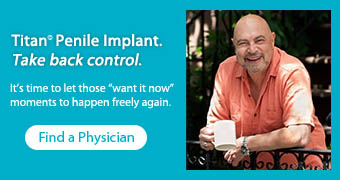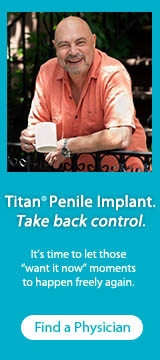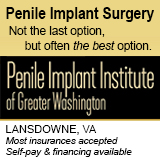What is the evidence on taking antibiotics as a post-surgery infection prophylaxis?
You do it before certain other surgeries, even dental surgeries.
Would it not make sense to take antibiotics after implant surgery as well?
Taking antibiotics post-op to minimize infection risk?
Re: Taking antibiotics post-op to minimize infection risk?
I was implanted on December 13 and my doctor gave a two week supply of Keflex. I had to take three tablets twice a day, after surgery. However, I was in the doctor’s office yesterday and the nurse practitioner told me that most guys don’t finish the whole round. He said the Keflex is good at fighting or killing surface bacteria, but that it would not really help if the implant itself became infected. I wish I had known this because taking that heavy duty amount of antibiotics destroyed my stomach. However, if there’s any help at all from it, I guess it was worth it?
Always consult with your doctor and get his or her opinion, but I’m just telling you what I was told. I was given a lot of brochures from the doctor’s office and read and highlighted them and also watched videos that the doctor has. Then I found out that the actual protocol was different in some cases, but I only learned about them afterwards. There’s a range of protocols among all the implant doctors, and not just regarding antibiotics. They all activate the implant at very different times. Seems like there isn’t a single standard, which can be frustrating for us guys who read about all the differences on this forum. The good news is that in the vast majority of cases, all these different protocols tend to lead to a similar, good result.
Always consult with your doctor and get his or her opinion, but I’m just telling you what I was told. I was given a lot of brochures from the doctor’s office and read and highlighted them and also watched videos that the doctor has. Then I found out that the actual protocol was different in some cases, but I only learned about them afterwards. There’s a range of protocols among all the implant doctors, and not just regarding antibiotics. They all activate the implant at very different times. Seems like there isn’t a single standard, which can be frustrating for us guys who read about all the differences on this forum. The good news is that in the vast majority of cases, all these different protocols tend to lead to a similar, good result.
64 years old, pills stopped working; Struggled with injections and restriction bands for past 4 years, minimal success. Implanted 12/13/24, by Dr. Eid, classic Titan. My journal:
viewtopic.php?f=6&t=25672#p243128
viewtopic.php?f=6&t=25672#p243128
- duke_cicero
- Posts: 274
- Joined: Tue May 28, 2024 2:58 pm
Re: Taking antibiotics post-op to minimize infection risk?
astrius wrote:What is the evidence on taking antibiotics as a post-surgery infection prophylaxis?
You do it before certain other surgeries, even dental surgeries.
Would it not make sense to take antibiotics after implant surgery as well?
You do have antibiotics pumped into you intravenously before the implant surgery is done. They of course also wash the tissues with similar fluids during the surgery. Take your course of antibiotics. You don't want to be the weak link in this situation.
Born 1990. ED since age 20 after a bicycle accident. Coloplast Genesis malleable implanted December 2024. Read my implant journal here.
Re: Taking antibiotics post-op to minimize infection risk?
Your iv pumps you full of antibiotics during your hospital stay.
Re: Taking antibiotics post-op to minimize infection risk?
I would personally follow the surgeon's recommendation and continue the post-op antibiotic prophylaxis, even if the evidence may not be very strong.
Lancet Infectuous Diseases Journal
2020 Oct
de Jonge SW, Boldingh QJJ, Solomkin JS, Dellinger EP, Egger M, Salanti G, Allegranzi B, Boermeester MA.
Effect of postoperative continuation of antibiotic prophylaxis on the incidence of surgical site infection: a systematic review and meta-analysis.
Background: Antibiotic prophylaxis is frequently continued for 1 day or more after surgery to prevent surgical site infection. Continuing antibiotic prophylaxis after an operation might have no advantage compared with its immediate discontinuation, and it unnecessarily exposes patients to risks associated with antibiotic use. In 2016, WHO recommended discontinuation of antibiotic prophylaxis after surgery. We aimed to update the evidence that formed the basis for that recommendation.
Methods: For this systematic review and meta-analysis, we searched MEDLINE, Embase, CINAHL, CENTRAL, and WHO regional medical databases for randomised controlled trials (RCTs) on postoperative antibiotic prophylaxis that were published from Jan 1, 1990, to July 24, 2018. RCTs comparing the effect of postoperative continuation versus discontinuation of antibiotic prophylaxis on the incidence of surgical site infection in patients undergoing any surgical procedure with an indication for antibiotic prophylaxis were eligible. The primary outcome was the effect of postoperative surgical antibiotic prophylaxis continuation versus its immediate discontinuation on the occurrence of surgical site infection, with a prespecified subgroup analysis for studies that did and did not adhere to current best practice standards for surgical antibiotic prophylaxis. We calculated summary relative risks (RRs) with corresponding 95% CIs using a random effects model (DerSimonian and Laird). We evaluated heterogeneity with the χ2 test, I2, and τ2, and visually assesed publication bias with a contour-enhanced funnel plot. This study is registered with PROSPERO, CRD42017060829.
Findings: We identified 83 relevant RCTs, of which 52 RCTs with 19 273 participants were included in the primary meta-analysis. The pooled RR of surgical site infection with postoperative continuation of antibiotic prophylaxis versus its immediate discontinuation was 0·89 (95% CI 0·79-1·00), with low heterogeneity in effect size between studies (τ2=0·001, χ2 p=0·46, I2=0·7%). Our prespecified subgroup analysis showed a significant association between the effect estimate and adherence to best practice standards of surgical antibiotic prophylaxis: the RR of surgical site infection was reduced with continued antibiotic prophylaxis after surgery compared with its immediate discontinuation in trials that did not meet best practice standards (0·79 [95% CI 0·67-0·94]) but not in trials that did (1·04 [0·85-1·27]; p=0·048). Whether studies adhered to best practice standards explained all variance in the pooled estimate from the primary meta-analysis.
Interpretation of findings: Overall, we identified no conclusive evidence for a benefit of postoperative continuation of antibiotic prophylaxis over its discontinuation. When best practice standards were followed, postoperative continuation of antibiotic prophylaxis did not yield any additional benefit in reducing the incidence of surgical site infection. These findings support WHO recommendations against this practice.
Lancet Infectuous Diseases Journal
2020 Oct
de Jonge SW, Boldingh QJJ, Solomkin JS, Dellinger EP, Egger M, Salanti G, Allegranzi B, Boermeester MA.
Effect of postoperative continuation of antibiotic prophylaxis on the incidence of surgical site infection: a systematic review and meta-analysis.
Background: Antibiotic prophylaxis is frequently continued for 1 day or more after surgery to prevent surgical site infection. Continuing antibiotic prophylaxis after an operation might have no advantage compared with its immediate discontinuation, and it unnecessarily exposes patients to risks associated with antibiotic use. In 2016, WHO recommended discontinuation of antibiotic prophylaxis after surgery. We aimed to update the evidence that formed the basis for that recommendation.
Methods: For this systematic review and meta-analysis, we searched MEDLINE, Embase, CINAHL, CENTRAL, and WHO regional medical databases for randomised controlled trials (RCTs) on postoperative antibiotic prophylaxis that were published from Jan 1, 1990, to July 24, 2018. RCTs comparing the effect of postoperative continuation versus discontinuation of antibiotic prophylaxis on the incidence of surgical site infection in patients undergoing any surgical procedure with an indication for antibiotic prophylaxis were eligible. The primary outcome was the effect of postoperative surgical antibiotic prophylaxis continuation versus its immediate discontinuation on the occurrence of surgical site infection, with a prespecified subgroup analysis for studies that did and did not adhere to current best practice standards for surgical antibiotic prophylaxis. We calculated summary relative risks (RRs) with corresponding 95% CIs using a random effects model (DerSimonian and Laird). We evaluated heterogeneity with the χ2 test, I2, and τ2, and visually assesed publication bias with a contour-enhanced funnel plot. This study is registered with PROSPERO, CRD42017060829.
Findings: We identified 83 relevant RCTs, of which 52 RCTs with 19 273 participants were included in the primary meta-analysis. The pooled RR of surgical site infection with postoperative continuation of antibiotic prophylaxis versus its immediate discontinuation was 0·89 (95% CI 0·79-1·00), with low heterogeneity in effect size between studies (τ2=0·001, χ2 p=0·46, I2=0·7%). Our prespecified subgroup analysis showed a significant association between the effect estimate and adherence to best practice standards of surgical antibiotic prophylaxis: the RR of surgical site infection was reduced with continued antibiotic prophylaxis after surgery compared with its immediate discontinuation in trials that did not meet best practice standards (0·79 [95% CI 0·67-0·94]) but not in trials that did (1·04 [0·85-1·27]; p=0·048). Whether studies adhered to best practice standards explained all variance in the pooled estimate from the primary meta-analysis.
Interpretation of findings: Overall, we identified no conclusive evidence for a benefit of postoperative continuation of antibiotic prophylaxis over its discontinuation. When best practice standards were followed, postoperative continuation of antibiotic prophylaxis did not yield any additional benefit in reducing the incidence of surgical site infection. These findings support WHO recommendations against this practice.
40, Coloplast Genesis, 1/2025, Dr. Christine, UCAL
Re: Taking antibiotics post-op to minimize infection risk?
Follow your surgeons advice. If you have concerns or want to be on additional antibiotics then tell them. But ultimately follow their directions.
It’s tempting to try to be Dr Google, but they are the experts.
It’s tempting to try to be Dr Google, but they are the experts.
56yo, NYC. ED started at 40. Pills, then shots for 10 years. 24cm Coloplast Titan w/classic pump by Dr Eid 3/25/2025. Will meet for show & tell.
Implant journal: [url] viewtopic.php?f=6&t=26225[/url]
Implant journal: [url] viewtopic.php?f=6&t=26225[/url]
Re: Taking antibiotics post-op to minimize infection risk?
LastHope wrote:I would personally follow the surgeon's recommendation and continue the post-op antibiotic prophylaxis, even if the evidence may not be very strong.
Lancet Infectuous Diseases Journal
2020 Oct
de Jonge SW, Boldingh QJJ, Solomkin JS, Dellinger EP, Egger M, Salanti G, Allegranzi B, Boermeester MA.
Effect of postoperative continuation of antibiotic prophylaxis on the incidence of surgical site infection: a systematic review and meta-analysis.
Background: Antibiotic prophylaxis is frequently continued for 1 day or more after surgery to prevent surgical site infection. Continuing antibiotic prophylaxis after an operation might have no advantage compared with its immediate discontinuation, and it unnecessarily exposes patients to risks associated with antibiotic use. In 2016, WHO recommended discontinuation of antibiotic prophylaxis after surgery. We aimed to update the evidence that formed the basis for that recommendation.
Methods: For this systematic review and meta-analysis, we searched MEDLINE, Embase, CINAHL, CENTRAL, and WHO regional medical databases for randomised controlled trials (RCTs) on postoperative antibiotic prophylaxis that were published from Jan 1, 1990, to July 24, 2018. RCTs comparing the effect of postoperative continuation versus discontinuation of antibiotic prophylaxis on the incidence of surgical site infection in patients undergoing any surgical procedure with an indication for antibiotic prophylaxis were eligible. The primary outcome was the effect of postoperative surgical antibiotic prophylaxis continuation versus its immediate discontinuation on the occurrence of surgical site infection, with a prespecified subgroup analysis for studies that did and did not adhere to current best practice standards for surgical antibiotic prophylaxis. We calculated summary relative risks (RRs) with corresponding 95% CIs using a random effects model (DerSimonian and Laird). We evaluated heterogeneity with the χ2 test, I2, and τ2, and visually assesed publication bias with a contour-enhanced funnel plot. This study is registered with PROSPERO, CRD42017060829.
Findings: We identified 83 relevant RCTs, of which 52 RCTs with 19 273 participants were included in the primary meta-analysis. The pooled RR of surgical site infection with postoperative continuation of antibiotic prophylaxis versus its immediate discontinuation was 0·89 (95% CI 0·79-1·00), with low heterogeneity in effect size between studies (τ2=0·001, χ2 p=0·46, I2=0·7%). Our prespecified subgroup analysis showed a significant association between the effect estimate and adherence to best practice standards of surgical antibiotic prophylaxis: the RR of surgical site infection was reduced with continued antibiotic prophylaxis after surgery compared with its immediate discontinuation in trials that did not meet best practice standards (0·79 [95% CI 0·67-0·94]) but not in trials that did (1·04 [0·85-1·27]; p=0·048). Whether studies adhered to best practice standards explained all variance in the pooled estimate from the primary meta-analysis.
Interpretation of findings: Overall, we identified no conclusive evidence for a benefit of postoperative continuation of antibiotic prophylaxis over its discontinuation. When best practice standards were followed, postoperative continuation of antibiotic prophylaxis did not yield any additional benefit in reducing the incidence of surgical site infection. These findings support WHO recommendations against this practice.
On the flip side, I personally also wouldn't fire the surgeon for not recommending post-op antibiotic prophylaxis, as the evidence is not very strong.
40, Coloplast Genesis, 1/2025, Dr. Christine, UCAL
Re: Taking antibiotics post-op to minimize infection risk?
LastHope wrote:LastHope wrote:I would personally follow the surgeon's recommendation and continue the post-op antibiotic prophylaxis, even if the evidence may not be very strong.
Lancet Infectuous Diseases Journal
2020 Oct
de Jonge SW, Boldingh QJJ, Solomkin JS, Dellinger EP, Egger M, Salanti G, Allegranzi B, Boermeester MA.
Effect of postoperative continuation of antibiotic prophylaxis on the incidence of surgical site infection: a systematic review and meta-analysis.
Background: Antibiotic prophylaxis is frequently continued for 1 day or more after surgery to prevent surgical site infection. Continuing antibiotic prophylaxis after an operation might have no advantage compared with its immediate discontinuation, and it unnecessarily exposes patients to risks associated with antibiotic use. In 2016, WHO recommended discontinuation of antibiotic prophylaxis after surgery. We aimed to update the evidence that formed the basis for that recommendation.
Methods: For this systematic review and meta-analysis, we searched MEDLINE, Embase, CINAHL, CENTRAL, and WHO regional medical databases for randomised controlled trials (RCTs) on postoperative antibiotic prophylaxis that were published from Jan 1, 1990, to July 24, 2018. RCTs comparing the effect of postoperative continuation versus discontinuation of antibiotic prophylaxis on the incidence of surgical site infection in patients undergoing any surgical procedure with an indication for antibiotic prophylaxis were eligible. The primary outcome was the effect of postoperative surgical antibiotic prophylaxis continuation versus its immediate discontinuation on the occurrence of surgical site infection, with a prespecified subgroup analysis for studies that did and did not adhere to current best practice standards for surgical antibiotic prophylaxis. We calculated summary relative risks (RRs) with corresponding 95% CIs using a random effects model (DerSimonian and Laird). We evaluated heterogeneity with the χ2 test, I2, and τ2, and visually assesed publication bias with a contour-enhanced funnel plot. This study is registered with PROSPERO, CRD42017060829.
Findings: We identified 83 relevant RCTs, of which 52 RCTs with 19 273 participants were included in the primary meta-analysis. The pooled RR of surgical site infection with postoperative continuation of antibiotic prophylaxis versus its immediate discontinuation was 0·89 (95% CI 0·79-1·00), with low heterogeneity in effect size between studies (τ2=0·001, χ2 p=0·46, I2=0·7%). Our prespecified subgroup analysis showed a significant association between the effect estimate and adherence to best practice standards of surgical antibiotic prophylaxis: the RR of surgical site infection was reduced with continued antibiotic prophylaxis after surgery compared with its immediate discontinuation in trials that did not meet best practice standards (0·79 [95% CI 0·67-0·94]) but not in trials that did (1·04 [0·85-1·27]; p=0·048). Whether studies adhered to best practice standards explained all variance in the pooled estimate from the primary meta-analysis.
Interpretation of findings: Overall, we identified no conclusive evidence for a benefit of postoperative continuation of antibiotic prophylaxis over its discontinuation. When best practice standards were followed, postoperative continuation of antibiotic prophylaxis did not yield any additional benefit in reducing the incidence of surgical site infection. These findings support WHO recommendations against this practice.
On the flip side, I personally also wouldn't fire the surgeon for not recommending post-op antibiotic prophylaxis, as the evidence is not very strong.
I was not given any antibiotics post-op--was told they slow healing. I was fine.
40. Implanted July 5, 2024, by Dr. Andrew Kramer, Urology Associates of Cape Cod. AMS LGX, 21cm cylinders + 2cm RTEs. Idiopathic "hard flaccid" ED following bacterial infection. Tried pulse waves, Cialis, TRT, even spinal injections. Nada.
Re: Taking antibiotics post-op to minimize infection risk?
I think it depends on the doctor as to what you are going to get.
I had the AMS 700 CX implanted which has a coating built in. The doc did send me home with I think was three days of antibiotics (broad spectrum and strong stuff). I did develop an abscess on a stitch and began panicing. My doc (who does a ton of these in Baltimore) said that sometimes revisions DO have to be done but they are a lot more rare than you think. Paying attention to what kind of infection is starting is important. He did a culture of my stitch to be sure and it came up with Staph. As he said "probably the most common there is - but we took two samples - one had staph the other didn't meaning the first probably came from the skin near it and we can be sure there wasn't an internal. The big clues for infection are swelling near the pump, pain and fever. If you don't have those its probably not an infection of the pump and more likely an infection of the incision which is easier to treat than the pump itself. To ease my mind he gave me a round of Cephalexin. So far so good. Wound looks much better as time goes on.
I had the AMS 700 CX implanted which has a coating built in. The doc did send me home with I think was three days of antibiotics (broad spectrum and strong stuff). I did develop an abscess on a stitch and began panicing. My doc (who does a ton of these in Baltimore) said that sometimes revisions DO have to be done but they are a lot more rare than you think. Paying attention to what kind of infection is starting is important. He did a culture of my stitch to be sure and it came up with Staph. As he said "probably the most common there is - but we took two samples - one had staph the other didn't meaning the first probably came from the skin near it and we can be sure there wasn't an internal. The big clues for infection are swelling near the pump, pain and fever. If you don't have those its probably not an infection of the pump and more likely an infection of the incision which is easier to treat than the pump itself. To ease my mind he gave me a round of Cephalexin. So far so good. Wound looks much better as time goes on.
48yo gay married male - Size before cancer / ED = 7.5" x 6.25" (current 5.5x5.2). AMS 700 CX implanted 12/9/24. 18cm + 1cm RTE and 18cm + 2cm RTE.
Implant Journal: https://www.franktalk.org/phpBB3/viewtopic.php?t=25158
Implant Journal: https://www.franktalk.org/phpBB3/viewtopic.php?t=25158
Who is online
Users browsing this forum: Sycamore and 54 guests







